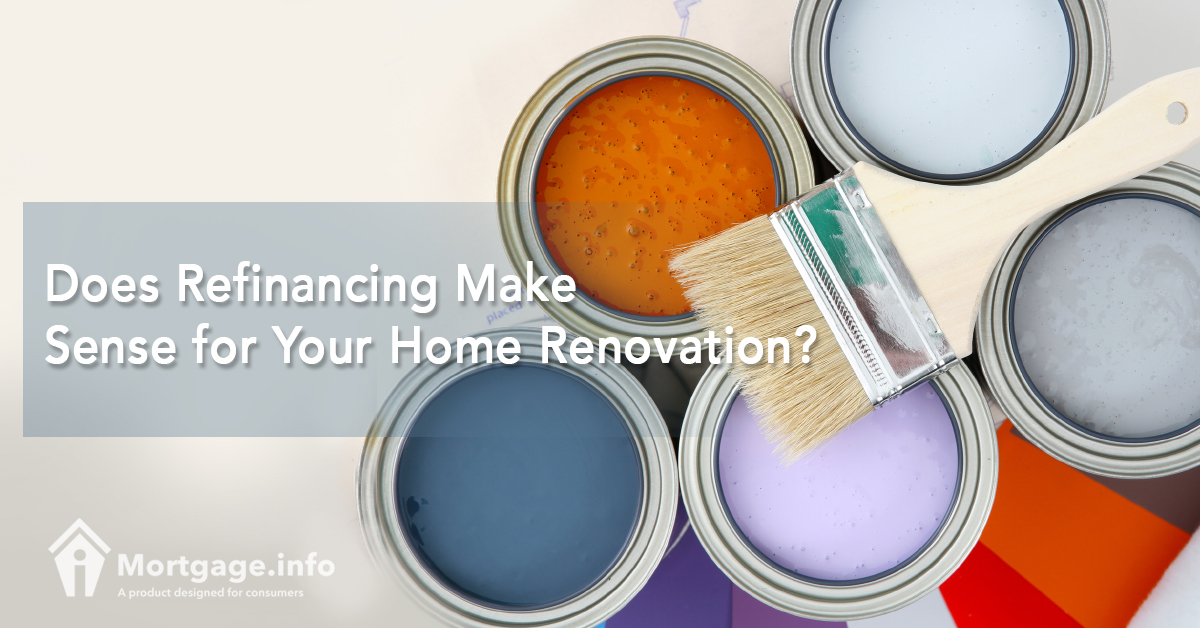Today’s interest rates make it easy for homeowners to save money every month. There are several ways to do this. You can refinance your first loan, taking on a lower interest rate or you can tap into the equity in your home while taking advantage of the lower rates. Typically, you can use the money from the equity in your home on anything you want including home renovation plans. This makes remodeling or repairing your home more affordable.
When Can You Refinance to Pay for Your Home Renovation?
As long as you have equity in your home, you have the ability to try to refinance your mortgage. Whether you will qualify for the program depends on your financial situation including your credit score, income, employment history, and assets. Cash-out loans have stricter guidelines than rate/term refinances because of the risk they pose. For example, most conventional loans allow you to take cash out up to 80% of the value of your home. If your home is worth $350,000 and you have an outstanding principal balance of $250,000, you have a current LTV of 71%. If you have decent credit and a good debt ratio, you can probably borrow up to $280,000, which is 80% of $350,000. This leaves you with $30,000 for renovations.
Why Should You Pay for Home Renovations with a Refinance?
Knowing you can refinance to pay for home renovations does not mean you have to, though. There are, however, several benefits of using the equity in your home to pay for remodeling or repairs. This is especially true if you have the credit and compensating factors to qualify for a “low” interest rate. Let’s say you currently have a 4% interest rate, but a new cash-out refinance can provide you with a 3.8% interest rate based on today’s rates. Not only do you get the funds necessary for your renovations from the equity in your home, but you also get a lower interest rate. You could have the same or similar mortgage payment and be able to make changes to your home without dipping into your pocket.
Reasons You Should Not Refinance for a Home Renovation
Sometimes it doesn’t make sense to refinance for a home renovation. If you already have a rather low-interest rate, you might not be able to match it with today’s rates. If your interest rate increases, your payment also goes up. This takes away from your monthly savings. If this means it affects your retirement or long-term savings, it might not make sense to go this route as you will suffer down the road.
It also might not make sense if the new loan will cost you a lot of money now. Borrowers sometimes forget about the closing costs. Whether you have to bring the money to the table or you finance the closing costs, you pay for them one way or another. This takes away from the benefits of refinancing for a home renovation.
Consider the APR
Many borrowers get wrapped up in the low-interest rate a lender offers them, forgetting about the APR. If the interest rate seems too good to be true, it might be. Lenders who offer the extremely low rates tend to beef up the closing costs to make up for the lower interest. This might not be in your best interest. You have to look at the big picture – the APR. This shows you what the mortgage really costs you after all costs. The interest rate that once looked so low can suddenly be rather high.
Refinancing Versus a Home Equity Loan
Another option to finance home renovation plans is to take out a home equity loan. This is an additional mortgage on your home. Sometimes this option makes more sense, especially if you already have a low-interest rate on your first mortgage. Closing costs on a home equity loan are often lower than a cash-out first mortgage as well. This enables you to save more money. If you can lower your interest rate on your first mortgage, however, cashing out your primary loan usually saves you the most money in the end. The exception to this rule is if you plan to move in the next few years. Generally, if you move within five years, it does not pay to refinance your first mortgage – an HELOC makes more sense in this case.
Staying in Your Home
The bottom line is you need to determine how long you will stay in your home. No matter how low of an interest rate you can secure, it home renovation still costs money. If you will not be in the home to see a return on your investment, refinancing might not be worth it. If this is your long-term home, however, paying the renovations off slowly with a 20 or 30-year mortgage might make sense.
The easiest way to determine the right choice is to sit down with all of your options. Obtain a Loan Estimate from every lender you apply for a loan with to see your options. Don’t just look at the interest rate or the closing costs – look at the whole picture. See how much the loan costs you over the life of the loan, not just today. This way you can truly determine if refinancing is the right choice for your home renovation plans.

